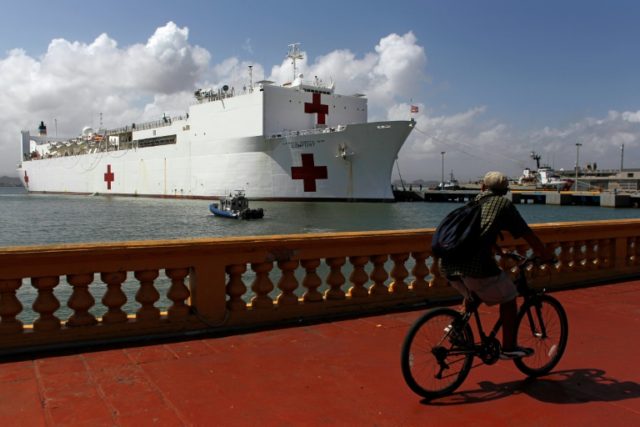Venezuela’s socialist regime accepted humanitarian aid in the form of medical assistance from China this week in an effort to diminish the impact of the collapse of the nation’s health care system.
The arrival of international aid to the country is notable given that the socialist dictatorship running it has for years rejected humanitarian aid, repeatedly claiming that the nation does not need it. It has especially rejected any aid from its neighbors, non-socialist countries, and the United States, accepting Chinese aid at a time in which the Chinese medical industry is under particular scrutiny for manufacturing substandard products.
In a tweet on Wednesday, the general secretary of Venezuela’s defense counsel, Angiolillo Fernández, said that a Chinese hospital ship would arrive in Venezuela to help some of the millions of people suffering from untreated medical issues.
“Chinese hospital ship will carry out operations in Venezuela to beat the sabotage of the U.S.,” Fernández wrote. “The coordination for the ‘arrival of the Chinese Navy’ was ordered by Venezuelan President Nicolás Maduro Moros.”
The operational strategic commander of the Armed Forces, Remigio Ceballos, also declared that the military would launch a “comprehensive combined strategic operation to strengthen the defense of the nation against cross-border and internal threats.”
Beijing’s medical aid arrives as outrage spreads in the country over negligence in its healthcare industry, thrust in the spotlight by a scandal surrounding the provision of nearly one million faulty vaccines. China’s second-largest vaccine manufacturer recently admitted to using expired materials to manufacture a variety of vaccines typically used on children, resulting in hundreds of thousands of children for all purposes going through life unvaccinated.
The scandal has been such a source of embarrassment for China that, this month, Radio Free Asia reported that North Koreans aware of it through word of mouth from traveling businessmen have begun refusing to buy medicines they know came from China.
“North Korean residents who have heard that China often has trouble with fake medicines now distrust the Chinese medicines available in local markets, which may also be fake,” a source told the outlet.
While the aid may not be good enough for North Koreans, the socialist regime in Venezuela has reportedly readily accepted it. Pharmaceutical authorities in the Latin American country have confirmed that 95 percent of the drugs considered essential to run a functional health care system by the World Health Organization (WHO) are unavailable, most hospitals lack everything from medical equipment to cleaning products for sanitation, and water and electricity shortages are now common in the summer.
It remains unclear who will distribute the Chinese aid in the country. While the government has rejected food aid, it launched a program known as the CLAP system in which it distributes food aid nationwide, a program riddled with corruption, as local socialist leaders refuse to feed families that do not show loyalty to the regime by attending marches or voting in the nation’s occasional fraudulent elections.
The move indicates that Beijing continues to see Venezuela as an opportunity to expand its influence over Latin America, even as it has contained its enthusiasm for the failed Venezuelan economy. Relations between the two countries have deteriorated over the past year following the Maduro regime’s failure to pay back debts of around $60 billion due to a chronic lack of oil production.
In June, it emerged that China had stopped loaning funds to Venezuela in 2016, with state media even urging investors to leave the country altogether. Beijing notably failed to congratulate Maduro on his sham election victory in May, another sign its attitude toward Venezuela had changed.
The acceptance of Chinese medical aid, despite its risks, follows the rejection of American offers to aid those affected by the crisis. In April, the State Department confirmed that “the Maduro regime continues to reject offers of international assistance.” Washington has nonetheless continued to offer help, if not within Venezuela, to Venezuelan refugees in the region.
On Monday, The Pentagon announced its intention to send the USNS Comfort ship to Colombia to help ease the pressure of the country’s deep humanitarian crisis, where millions of people are now malnourished and prone to infectious diseases.
“The plan is for that hospital ship, USNS Comfort, to deploy this fall,” Col. Robert Manning, a Pentagon spokesman, said during a Monday media briefing. “The details are being worked out as far as a detailed timeline.”
The 250-bed ship was last used during the hurricane in Puerto Rico, where it arrived with about 750 Navy medical staff onboard that included nurses, pediatricians, surgeons, technicians and various other support personnel. The operation allowed treatment for 1,899 patients and the performing of 191 surgeries, although demand is likely to be much higher among Venezuelan migrants, many of whom have no resources at all.
The Maduro regime has also rejected offers of aid from the international community, repeatedly denying the existence of the worsening humanitarian crisis. As a result, U.S. aid operations have mainly focused on providing financial aid to help Venezuelan refugees in Colombia. Bogotá and Washington continue to enjoy longstanding close ties and Colombia has been among the most vocal government opposing Maduro’s regime.
Follow Ben Kew on Facebook, Twitter at @ben_kew, or email him at bkew@breitbart.com.

COMMENTS
Please let us know if you're having issues with commenting.